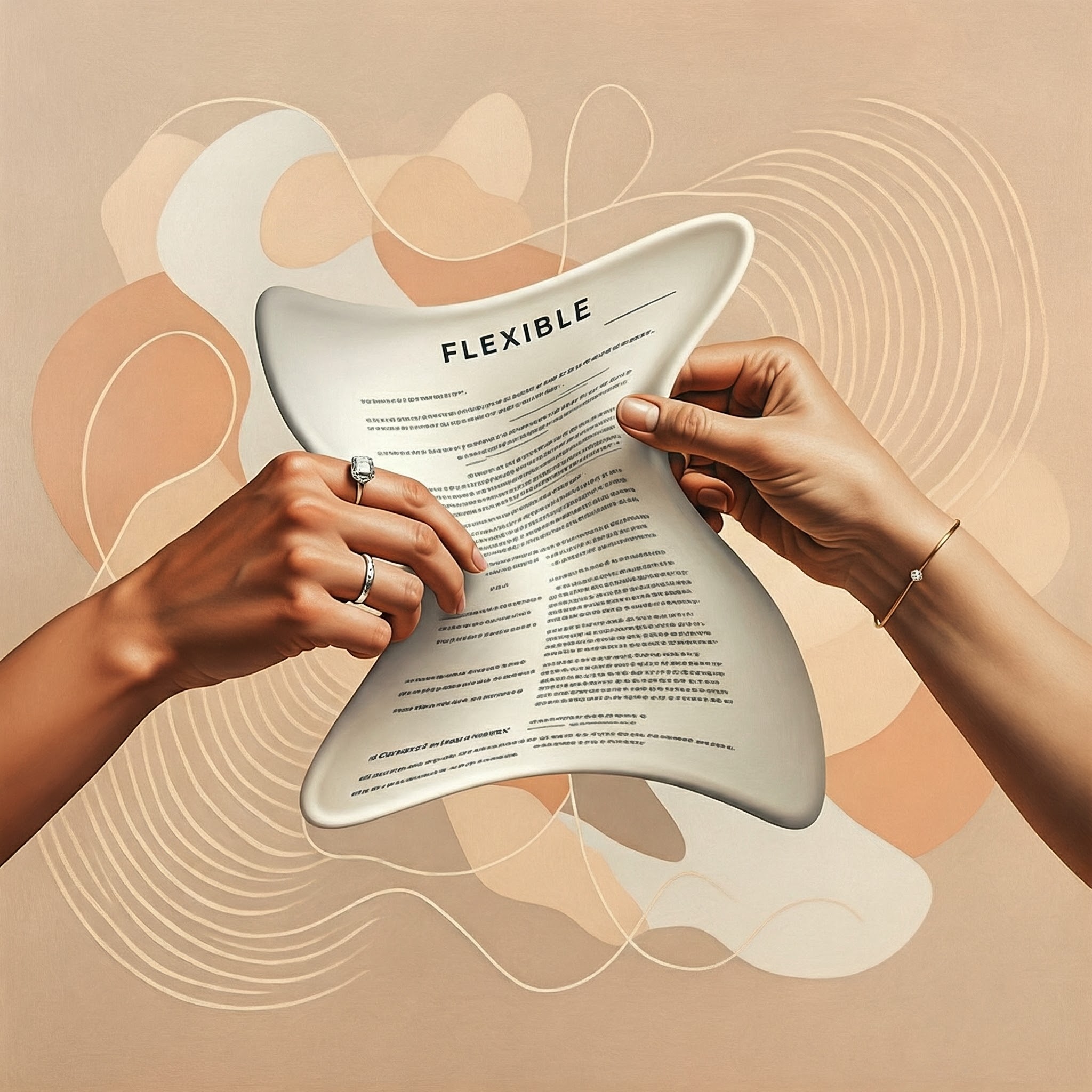Flexible
Definition
Flexible is an adjective that refers to the ability to bend or be bent easily without breaking. It also describes adaptability or the capacity to adjust to different circumstances or requirements.
Parts of Speech
- Adjective
Pronunciation
American English
- IPA Pronunciation: /ˈflɛksəbəl/
- Respelling: FLEK-suh-buhl
British English
- IPA Pronunciation: /ˈflɛksɪbəl/
- Respelling: FLEK-sih-buhl
Etymology
The word "flexible" originates from the Latin "flexibilis," meaning "capable of being bent," derived from "flectere," which means "to bend." It entered Middle English via Old French, retaining its core meanings of physical pliability and adaptability.
Derivatives
- Flexibility (noun)
- Flexibly (adverb)
- Flexion (noun)
- Inflexible (adjective)
- Reflexible (adjective, rare)
Synonyms
- Adaptable
- Pliable
- Adjustable
Antonyms
- Rigid
- Inflexible
- Unyielding
Usage
The term "flexible" is used to describe both physical properties and metaphorical adaptability. For example, "The rubber material is highly flexible," or "She has a flexible schedule that allows for changes."
Related Terms
- Elastic: Capable of returning to its original shape after being stretched or compressed.
- Adaptability: The ability to adjust to different conditions or environments.
- Resilience: The ability to recover quickly from difficulties or setbacks.
Detailed Definitions
Adjective
- Capable of bending without breaking: Refers to physical pliability or suppleness.
- Example: "The flexible wire was easy to manipulate."
- Adaptable to different situations or requirements: Describes a person's or system's ability to adjust to varying conditions.
- Example: "Her flexible approach to problem-solving made her a valuable team member."
- Not rigidly fixed; open to change: Refers to something that can accommodate variations.
- Example: "The contract terms were flexible to accommodate both parties' needs."
flexible



🇨🇳 Mandarin
- 灵活
- IPA: /líng.huó/
- Respelling: líng-huó
- 柔韧
- IPA: /róu.rèn/
- Respelling: róu-rèn
🇮🇳 Hindi
- लचीला
- IPA: /ləˈʧiːlɑː/
- Respelling: lachīlā
- समयानुकूल
- IPA: /səməjaːˈnukul/
- Respelling: samayānukūl
🇪🇸 Spanish
- Flexible
- IPA: /flekˈsible/
- Respelling: flek-si-ble
- Elástico
- IPA: /elasˈtiko/
- Respelling: e-lás-ti-co
🇫🇷 French
- Flexible
- IPA: /flɛk.sibl/
- Respelling: flek-sibl
- Souple
- IPA: /supl/
- Respelling: souple
🇸🇦 Modern Standard Arabic
- مرن
- IPA: /murun/
- Respelling: murun
- لين
- IPA: /layyin/
- Respelling: layyin
🇧🇩 Bengali
- সোজা
- IPA: /soʤa/
- Respelling: soja
- লচ্ছিল
- IPA: /lotʃʰil/
- Respelling: lochchil
🇷🇺 Russian
- Гибкий
- IPA: /ˈɡʲipkʲɪj/
- Respelling: gibkiy
- Эластичный
- IPA: /ɪləsˈtʲit͡ɕnɨj/
- Respelling: elastichnyy
🇵🇹 Portuguese
- Flexível
- IPA: /flɛˈʃivɛl/
- Respelling: fle-shi-vel
- Elástico
- IPA: /eˈlaʃtiku/
- Respelling: e-lás-tico
🇮🇩 Indonesian
- Fleksibel
- IPA: /flɛkˈsibəl/
- Respelling: flek-sibel
- Lentur
- IPA: /lɛnˈtur/
- Respelling: lentur
🇩🇪 German
- Flexibel
- IPA: /flɛkˈsiːbəl/
- Respelling: flek-seebel
- Biegsam
- IPA: /ˈbiːksam/
- Respelling: biegsam
🇯🇵 Japanese
- 柔軟
- IPA: /ʤuː.nan/
- Respelling: jūnan
- フレキシブル
- IPA: /furekisiburu/
- Respelling: furekisiburu
🇻🇳 Vietnamese
- Linh hoạt
- IPA: /liŋ˧ hwaːt˧˩/
- Respelling: linh hoạt
- Mềm mại
- IPA: /mɛm˧˥ maj˧˥/
- Respelling: mềm mại
🇰🇷 Korean
- 유연하다
- IPA: /ju.jʌn.ha.da/
- Respelling: yu-yeon-ha-da
- 탄력적이다
- IPA: /tan.ryʌk.ʧʌg.i.da/
- Respelling: tan-ryeok-jjeog-i-da
🇹🇷 Turkish
- Esnek
- IPA: /ˈes.nek/
- Respelling: esnek
- Gevşek
- IPA: /gevˈʃek/
- Respelling: gevşek
🇵🇰 Urdu
- لچکدار
- IPA: /lʊʧˈkdaːr/
- Respelling: luchakdaar
- فلیکسبل
- IPA: /fleksəbəl/
- Respelling: fleksible





